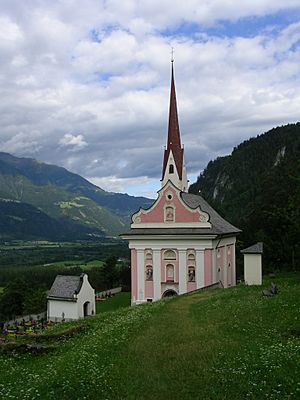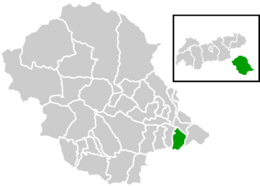Lavant, Tyrol facts for kids
Quick facts for kids
Lavant
|
||
|---|---|---|

St. Ulrich Pilgrimage Church, Lavant, Austria
|
||
|
||

Location within Lienz district
|
||
| Country | Austria | |
| State | Tyrol | |
| District | Lienz | |
| Area | ||
| • Total | 22.55 km2 (8.71 sq mi) | |
| Elevation | 675 m (2,215 ft) | |
| Time zone | UTC+1 (CET) | |
| • Summer (DST) | UTC+2 (CEST) | |
| Postal code |
9972
|
|
| Area code | 0 48 52 | |
| Vehicle registration | LZ | |
| Website | www.gemeindelavant.at | |
Lavant is a small town, also called a municipality, located in the Lienz District in East Tyrol, Austria. It sits in the beautiful upper Drautal valley, southeast of the city of Lienz.
Contents
History of Lavant
After the fifth century, Lavant became an important place, taking over from an older ancient Roman town called Aguntum.
In 1948, archaeologists made exciting discoveries on a mountain called Kirchbichl. They found old ruins from the late Roman and early Christian times. These ruins included:
- The remains of a castle where a bishop used to live.
- A Roman temple with tombs and special altars from the second and third centuries.
- A strong gate for a fort, protected by two towers.
- An early Christian church that was built in four different stages, starting in the fourth century.
This early church was destroyed in the seventh century, and a new one was built later. The local church in Lavant was first mentioned in official records in the year 1090.
Important Buildings
Lavant has some very old and interesting buildings.
Sts. Peter and Paul Church
The Sts. Peter and Paul Church was built in 1485. It has a Gothic style, which means it has pointed arches and tall windows. It was built on top of an even older fort from the Middle Ages. Inside, you can see:
- A Romanesque vault, which is a rounded ceiling from an even earlier style.
- Parts of Gothic altars that had wings, like a triptych.
- A flat Gothic wooden ceiling from 1516.
St. Ulrich Pilgrimage Church
The St. Ulrich Pilgrimage Church in Lavant dates back to the seventeenth century. It still has parts from the Gothic period, like its tower, the main entrance on the west side, and the choir area where the altar is. The church was updated in 1770. Later, beautiful paintings on the walls (frescoes), fancy rocaille decorations, and new interiors were added.
Gallery
See also
 In Spanish: Lavant para niños
In Spanish: Lavant para niños
 | Georgia Louise Harris Brown |
 | Julian Abele |
 | Norma Merrick Sklarek |
 | William Sidney Pittman |






